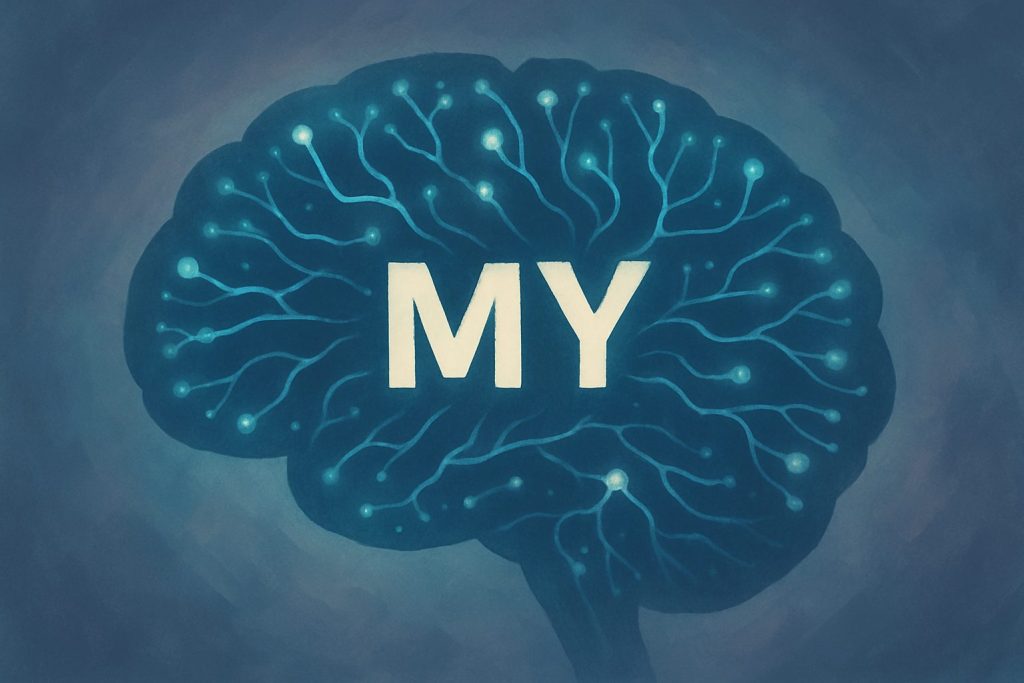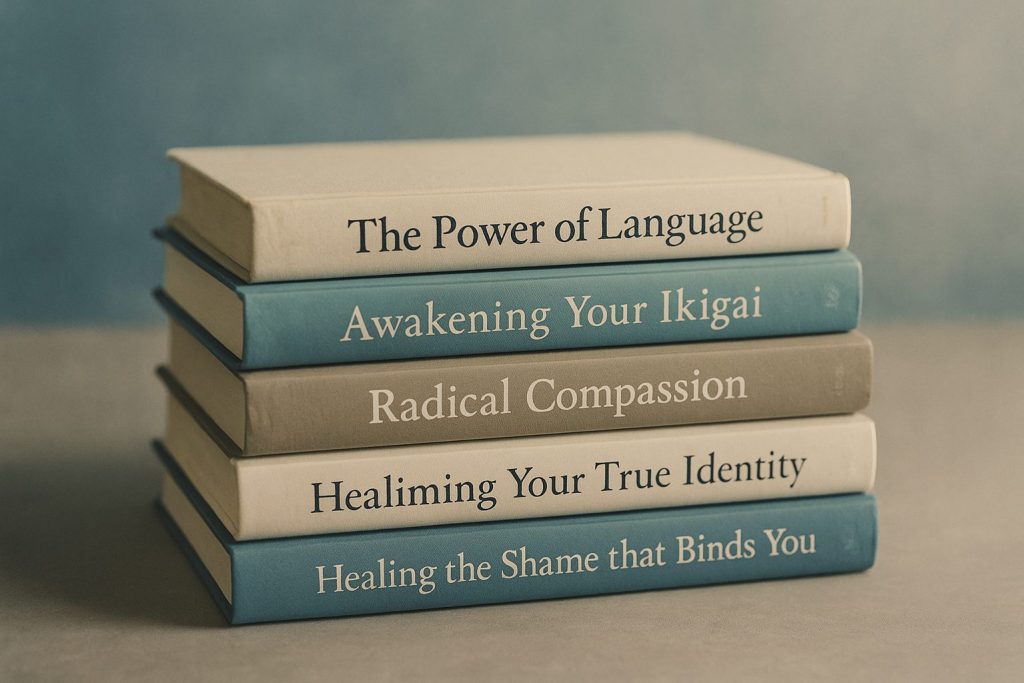Do you say it?
“My anxiety is back.”
“My anxiety’s getting worse.”
“My anxiety won’t let me sleep.”
It’s a phrase we hear all the time. But what if those two little words – “my anxiety” – are quietly making things harder?
It sounds harmless. Responsible, even. Like you’re self-aware and acknowledging what you’re going through. But language isn’t neutral. And in the case of anxiety, how you talk about it might be reinforcing the very thing you’re trying to move through.
If you’re looking for a broader understanding of Anxiety itself, you might also like this article on what anxiety really is.
Let’s look at what happens when we put “my” in front of something we want to heal.

What’s Really Happening When You Say “My Anxiety”
When you say my anxiety, you’re not just describing an experience – you’re claiming ownership of it.
In grammar, “my” is a possessive determiner. It shows that something belongs to you. And while that works perfectly for my house or my phone, it gets trickier when it comes to conditions, emotions, or states of mind.
Saying my anxiety is like stamping your name on it. You’re saying: this isn’t just something I feel – it’s part of who I am.
Compare these three phrases:
- I am anxious
- My anxiety is acting up
- There is anxiety present
Each one tells a different story about your relationship to the feeling.
The more you say my anxiety, the more you unconsciously train your mind to believe it’s part of you – not just something you experience.
When You Catch Yourself Saying “My Anxiety”

Before we even shift the words, something else has to happen: awareness.
That flash of mindfulness — the moment you realise, “I just called it mine again” — is actually a portal. A choice point. And it’s one of the most powerful tools in emotional transformation.
Techniques like mindfulness, noting, and even brief moments of self-inquiry can interrupt automatic speech patterns and bring them into consciousness. That’s where change begins.
You don’t have to be sitting on a meditation cushion to practice this. You just need a breath, a pause, and the willingness to notice.
Now, here’s what you can do when you catch yourself…
Catching yourself in the act of saying “my anxiety” is not failure — it’s a moment of power. It’s awareness. And awareness is the first tool of neuroplasticity.
So what can you do with that moment?
First, pause. Don’t scold yourself. Just notice.
Then, try one or more of these rewiring responses:
- Reframe aloud or in your head:
- “There’s anxiety showing up right now.”
- “This is a wave of feeling, not my identity.”
- Tap through it: Use EFT tapping to shift both the language and the emotional intensity. For example:
- Setup: “Even though I said ‘my anxiety’ again, I’m open to seeing this differently.”
- Reminder phrases: “This passing feeling,” “This anxious energy,” “Not mine forever.”
- Visualise a detachment: Picture the words “My Anxiety” floating away from you like a balloon, a shadow, or a label you’ve peeled off.
- Anchor a new phrase: Choose one sentence you do want to say. Say it three times. Write it down. This repetition activates the brain’s neuroplastic potential — literally wiring in a new pattern.
The brain doesn’t change with insight alone. It needs experience — even brief — of doing something different.
So every time you shift how you name the feeling, you’re not just correcting language. You’re creating a new pathway.
The Spell of Ownership

Language has power. And the words we use daily act like small spells – shaping how we see ourselves and our lives.
When you say my anxiety often enough, it becomes more than a description. It becomes an identity.
- You think of yourself as “someone with anxiety.”
- You prepare for it, manage it, expect it.
- You build routines around it. Relationships adjust to it.
Before long, the anxiety is no longer something moving through your life. It is your life.
From an energetic or spiritual perspective, this is significant. Words like “my” bind things to you. They attach. They root. Saying my anxiety over and over is like energetically signing a contract to keep it around.
Even in energy psychology practices like EFT (tapping), we see this all the time – the deeper the identification, the harder it is to shift.
How Language Wires the Brain

This isn’t just spiritual metaphor. It’s neuroscience.
The brain takes language seriously. Repetition creates neural pathways. When you repeat my anxiety, you’re deepening the groove that says, “This is mine. This is me.”
In contrast, saying something like “I notice anxiety arising” creates space. It keeps your sense of identity intact while allowing you to observe what’s happening. That distance makes a difference – psychologically, emotionally, and even physiologically.
Your nervous system responds differently when it doesn’t feel under personal attack.
How “My Anxiety” Became the Default
In recent years, the phrase “my anxiety” has become a kind of emotional shorthand. It’s everywhere — in memes, therapy circles, TikTok reels, even everyday small talk. And in many ways, that’s a good thing. Talking openly about mental health has helped people feel less alone.
But there’s a flip side.
As awareness has increased, so has a subtle form of over-identification. Saying “my anxiety” isn’t just about acknowledging symptoms anymore – it’s become part of how people introduce themselves, describe their identity, and build community.
Mental health diagnosis culture, the rise of social media, and the language of support groups have all contributed. Phrases like “my depression”, “my trauma”, or “my ADHD” feel personal and valid – but they can also quietly cement the struggle into our self-concept.
What started as visibility can sometimes turn into invisibility – where the person disappears behind the condition.
Reframing “My Anxiety”: A Side-by-Side Shift Table
Try softening how you talk about anxiety. The goal isn’t denial — it’s to reclaim your identity from it.
| Common Phrase | Gentler Reframe | Why It Matters |
|---|---|---|
| My anxiety is back | Anxiety is showing up right now | Removes ownership; treats it as temporary |
| My anxiety controls me | I feel overwhelmed by anxious energy | Creates space between you and the feeling |
| My anxiety ruins my day | Today’s been heavy with anxious thoughts | Focuses on experience, not identity |
| I am anxious | I’m noticing anxious sensations | Observation over identification |
| I suffer from anxiety | I’ve been navigating some anxiety | More active, less victim language |
You don’t have to pretend anxiety isn’t real. You just don’t have to call it yours.
📥 Free Download: Reframing Language Guide – “How to Stop Owning Anxiety with Your Words”
When Can You Start Speaking Differently?
Start with awareness. Listen to how often you say my anxiety. Not to judge yourself – just to notice.
Then, experiment. Try different phrases. Practice creating just a little more space between you and the feeling. You might be surprised how that space opens up room to breathe.
For a foundational overview of anxiety and how it shows up in the body, see What Is Anxiety?.
If you use EFT or journaling, make language part of your healing process. Rewrite the inner script. Remind yourself: this is something I’m experiencing, not something I am.
You can also explore this further through EFT. Try this EFT Script on TappingNomad.com to help begin loosening anxiety’s grip at the language level.
Suggested Reading: Language, Identity, and Emotional Healing

Below are a few powerful books that explore the link between language, belief, and healing. These affiliate links support the blog at no extra cost to you.
| Title | Author | Why It Fits |
| You Can Heal Your Life | Louise Hay | Explores how emotional language and thought patterns affect health |
| Breaking the Habit of Being Yourself | Dr. Joe Dispenza | Connects language, identity, and neurological change |
| The Body Keeps the Score | Bessel van der Kolk | A deeper dive into trauma, identity, and embodied memory |
| It Didn’t Start with You | Mark Wolynn | Great for exploring inherited narratives and subconscious phrasing |
| Clearing Karmic Debt | Nikeya Banks | Focuses on spiritual release and reclaiming your divine path |
What If You’re Not Your Anxiety After All?
What if anxiety is a visitor, not a roommate?
What if it’s not yours to carry forever?
The way you speak about anxiety can either reinforce your suffering – or loosen its grip.
You don’t need to own it. You only need to notice it. And from there, you can begin to let it go.
